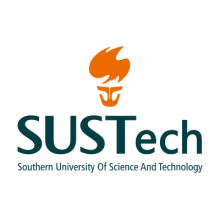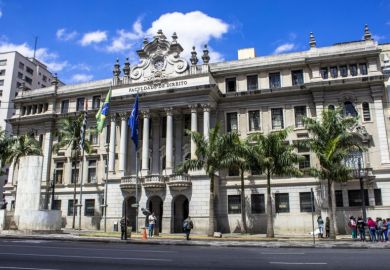Xue Qikun was not destined to become a university leader. Born into a farming family in the mountainous province of Shandong, “life was so hard”, he recalls. There was frequently not enough food, the classrooms at his school were basic and textbooks were in short supply.
He made it to university, but then twice failed the graduate school entrance exam.
“I am not a genius, I am not an exceptionally smart person, but I work hard,” says Xue, who now leads the 11-year-old Southern University of Science and Technology (SUSTech), an institution that aims to become world-class in years rather than centuries.
He is also one of China’s most accomplished physicists. President Xi Jinping has frequently cited Xue in speeches as an example of a Chinese scientist breaking new ground in fundamental research; Yang Chen Ning, who won the Nobel Prize in physics in 1957, said in 2013 that Xue had produced "the first Nobel-prizeworthy physics paper from a Chinese lab"; and in 2019, Xue was awarded the State Natural Science Award, China's highest accolade for breakthroughs in basic research.
Xue credits his humble beginnings – and his hands-on approach to leadership – for his ability to motivate and inspire his academics and students.
“People think, ‘I can do something like you. We are basically not that different’, so this is very encouraging for them,” he says.
Attracting talent
SUSTech is located in Shenzhen, which was little more than a fishing village 40 years ago but is now home to more than 17 million people, making it the sixth most populous city in China. It is described as the country’s answer to Silicon Valley.
Xue’s five-year plan for the university, which he drafted shortly after he took over as president in late 2020, is similarly all about growth. In 2018, the university was aiming for a total student count of no more than 10,000. But Xue plans to increase the number of undergraduates from 4,500 to 5000 and the number of postgraduates from 4,500 to 7,000. He also wants the number of academics to rise from 600 to 1,000. It is a strategy that has the approval of the city’s mayor, who last month encouraged the university to grow given that it had proved it could maintain quality.
In November, the Chinese Ministry of Education approved plans for a new joint education institute between SUSTech and King’s College London. The centre in Shenzhen will deliver programmes in medicine, biomedical science and biomedical engineering.
Xue says the collaboration will help fast-track the development of medical science at SUSTech and in three years the university will have an on-campus hospital and medical school building.
In about five years, he expects the university will also be making plans to open a second, smaller campus in Shenzhen to enable further growth and to host large-scale scientific facilities.
A key priority for Xue is persuading top academics to choose to do research and to teach at SUSTech, rather than at any other university in the world. His strategy has been two-fold: offer leading scholars a starting fund so they can set up their own lab, and speak directly to potential new recruits.
“As president, I talk to almost every [academic] we would like to recruit,” he says. “In many cases, the younger faculty say they are moved. ‘Oh, the president talked to me; the president regards me very highly.’ So they like it.”
Xue estimates that about three-quarters of the new academics will come from universities overseas, but the majority will be scholars who were born in China.
“The first group of faculty at SUSTech were mainly from abroad. This is a very good channel to establishing international partnerships,” he says.
The minister of education has also made it clear that domestic mobility, which could result in the weakening of some Chinese universities, is “not very much favoured”, he adds.
Resilience
Xue also takes a hands-on approach to the practice of research and teaching, regularly meeting with academics, especially younger scholars, to share ideas and provide motivation.
“The younger generation need some encouragement from a well-established professor,” he says. “They can enjoy the research and the teaching, but they don’t [always] know how they can be successful.”
He also speaks to them about his childhood and difficult early experience in academia.
“That hardship I experienced when I was young really gave me confidence to overcome any hardship in life or in [my] career,” he says.
Xue recalls that when he was a junior scholar, he would work in the lab from 7am until 11pm, six days a week.
“I completely devoted my time to research; I had no life at all. This kind of hardship is nothing, it was a piece of cake, because I had good food, the best lab, the best facilities for doing the best research.”
Some believe that rural students in China still face significant disadvantages when it comes to access to and success in higher education. Is this an issue Xue is keen to tackle in his leadership of SUSTech?
“The situation has completely changed,” he says. “Thirty years ago, it was very difficult [due to an] imbalance of development…There is now a marked difference. Of course, in Beijing and Shenzhen you have the best teachers, the best facilities and support, but for some child like me, [the opportunities are] already good enough to apply to university by taking the standard admission examination…While the teachers may be not as great, this kind of thing happens everywhere.”
Success factors
We are at a time in global higher education when the world is watching China, thanks to its rapid rise in research as a result of huge investment and a ruthless focus on publication. Many eyes are on SUSTech.
The university is ranked joint 162nd in the latest Times Higher Education World University Rankings, up from 301-350 just two years ago. Xue believes it could reach the top 100 within the next five years if it continues on the same trajectory.
He adds that the university’s rapid success to date ultimately comes down to its location.
“Shenzhen is very international, it’s a high-tech hub…and there is financial support,” he says. “The city knows that a great university is critical for the future of the city, [so it] gives [a lot of] support.”
Quick facts
Born: Shandong province of China, 1963
Academic qualifications: BSc in laser physics from Shandong University; PhD in condensed matter physics from the Institute of Physics at the Chinese Academy of Sciences
Lives with: His wife
Academic hero: Albert Einstein
This is part of our “Talking leadership” series of 50 interviews over 50 weeks with the people running the world’s top universities about how they solve common strategic issues and implement change. Follow the series here.
View the THE Young University Rankings 2022 results
Register to continue
Why register?
- Registration is free and only takes a moment
- Once registered, you can read 3 articles a month
- Sign up for our newsletter
Subscribe
Or subscribe for unlimited access to:
- Unlimited access to news, views, insights & reviews
- Digital editions
- Digital access to THE’s university and college rankings analysis
Already registered or a current subscriber?










